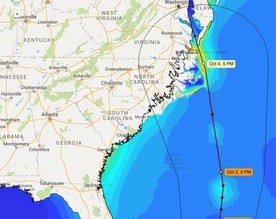Today the NSF announced major awards totaling more than $5 million to support four regional Data Hubs organized by some of the top universities and Big Data researchers in the country.
This program represents a unique approach to improving the impact of data science by establishing partnerships among likeminded stakeholders,” said Jim Kurose, NSF’s assistant director for Computer and Information Science and Engineering, which funds the program. “In doing so, it enables teams of data science researchers to come together with domain experts, with cities and municipalities, and with anchor institutions to establish and grow collaborations that will accelerate progress in a wide range of science and education domains with the potential for great societal benefit.”
The consortia are coordinated by top data scientists at Columbia University (Northeast Hub), Georgia Institute of Technology and the University of North Carolina (South Hub), the University of Illinois at Urbana-Champaign (Midwest Hub) and the University of California, San Diego, the University of California, Berkeley, and the University of Washington (West Hub).
Covering all 50 states, they include commitments from more than 250 organizations–from universities and cities to foundations and Fortune 500 corporations–with the ability to expand further over time.
Building upon the National Big Data Research and Development Initiative announced in 2012, the awards are made through the Big Data Regional Innovation Hubs (BD Hubs) program, which creates a new framework for multi-sector collaborations among academia, industry and government.
The “big data brain trust” assembled by the hubs will conceive, plan and support regional big data partnerships and activities to address regional challenges.
Among the benefits of the program are greater ease in initiating partnerships by reducing coordination costs; creating opportunities for sharing ideas, resources, and best practices; and bringing top talent to address important issues.
Issues the BD Hubs have identified as priorities include:
- New technologies for big data and data-driven discovery, including in healthcare and local health disparities
- Management of natural resources and impacts on habitat planning and hazards
- Precision agriculture and the food, energy and water nexus
- Education and smart and connected communities
- Precision medicine
- Energy, materials and manufacturing
- Finance
The BD Hubs will be sites for transitioning research into practice. They will also educate and train the next-generation workforce in data science.
The projects from this first phase of the program will help establish the governance structure of the BD Hub consortia, support the recruitment of executive directors and administrative staff for each BD Hub and begin developing approaches for interBD Hub collaborations.
In addition, the Computing Community Consortium will sponsor a program for the BD Hubs to bring together academic and industry researchers, including those early in their careers, to facilitate long-term partnerships to promote the goals of each BD Hub.
Support for projects at each BD Hub will come from a variety of sources in addition to NSF’s investments.
Big Data Spokes
NSF anticipates awarding $10 million in grants for the next phase of the BD Hubs, called the Big Data Spokes (BD Spokes), contingent upon the availability of funds. The BD Spokes program solicitation aims to help initiate research in specific priority areas identified by the BD Hubs.
Each BD Spoke will focus on a specific BD Hub priority area and address one or more of three key issues: improving access to data, automating the data lifecycle and applying data science techniques to solve domain science problems or demonstrate societal impact.
The BD Spokes aims to advance the goals and regional priorities of each BD Hub, fusing the strengths of the individual institutions and investigators and applying them to problems that affect communities, populations and groups within the region,” Kurose said.
Download the insideBIGDATA Guide to Scientific Research




